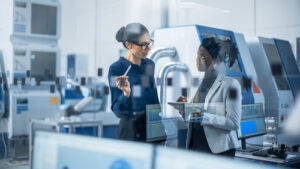Women in Science
The Contribution of Women to EU-Africa Science Objectives
The roles and contributions of women as thought leaders and principal investigators in these developments at the decision-making level, as well as at the execution level, need to be central to the decision-making processes underpinning these key programmes. Women PIs from across the countries of Africa and the EU have worked together under AERAP to outline the critical needs of this next decisive step forward by and for Women in Responsible Research and Innovation, across all disciplines and action areas.
At the launch of the EU Gender Action Plan (GAP) III of 25 November 2020, High Representative/Vice-President, Josep Borrell, said: “Ensuring the same rights to all empowers our societies. It makes them richer and more secure. It is a fact that goes beyond principles or moral duties. The participation and leadership of women and girls is essential for democracy, justice, peace, security, prosperity and a greener planet. With this new Gender Action Plan, we are pushing for more and faster progress towards gender equality.”https://ec.europa.eu/commission/presscorner/detail/en/IP_20_2184)
Commissioner for International Partnerships, Jutta Urpilainen, argued that: “Stronger engagement on gender equality is key to a sustainable global recovery from the COVID-19 crisis and to building fairer, more inclusive, more prosperous societies. Women and girls are in the frontline of the pandemic and must be put in the driving seat of the recovery. As a gender-sensitive and responsive geopolitical Commission, we want to work more closely with our Member States, as well as all partners, in building a truly gender-equal world.”

Tthe new EU Gender Action Plan (GAP III ) was presented to the Development Committee in the European Parliament by Josep Borrell, Vice-President of the European Commission/High Representative of the European Union for Foreign Affairs and Security Policy, and Jutta Urpilainen, Commissioner for International Partnerships. This Action Plan is an ambitious agenda for gender equality and women’s empowerment in EU external actions, which we wholly endorse.
We also see huge potential to underpin GAPIII with specific recommendations arrived at by collaborative high-level women scientists and researchers from all disciplines and all participating countries, through engagement in the AERAP subcommittee on Women in Science, Technology and Innovation.
Women constitute over 50% of the population in most global societies, and contribute very significantly at all levels to the socio-economic development of their communities locally, nationally and globally. Women are world-renowned leaders in the field of Education, including Science Education, and are top performers in Innovations in Learning and Community Engagement and in Teaching and Innovation across the STEM Disciplines. Yet women have long received only a small percentage of the research and innovation budgets globally: a situation which has been shown to have been exacerbated since the start of the COVID pandemic, with women’s rates of research, publication and success in competitive grants plummeting globally whilst legions of women quietly took on significant additional roles as caregivers to elders and as home-teachers and caregivers to children, whilst still being expected to compete on a completely non-level playing field with male researchers as timelines for competition shrank to fit the demands of a glut ‘rapid response’ grants which went almost exclusive to men. This situation of disparity (and the prejudices and unconscious biases which fuel it) must be addressed, urgently, with concrete, immediate requirements put in place to ensure a true and complete levelling of the playing field, starting with major investment in women to remedy the patriarchal bias against them in research.
Throughout Europe and Africa, increasing numbers of women are gaining academic qualifications and applying them by working in occupations which, for a long time, were primarily male preserves. Yet problems of ‘leaky pipelines’ to their promotion and the proverbial ‘glass ceiling’ to higher achievement of influential leadership positions remain as apparent as ever. Across the board, women hold a minority of positions overall, yet the positions occupied by women within fields such as Physics, Research and industrial applications still tend to be considerably more junior than those held by men with similar qualifications. Very little evidence suggests that roadblocks to women’s advancement (including basic measures such as taking account of women’s career breaks for rearing children, etc.) have been taken into consideration seriously or effectively to date. It is high time for this to change, radically and permanently.
The Women in Science subgroup
The AERAP Women in Science Sub group will address the need to action the following mandates:
– Dedicated funding allocations for Women in Science, Technology and Innovation under the forthcoming Horizon Europe and NDICI programmes, with a ‘per cent for women’ to be mandated as a top slice allocation to female PIs and female researchers at all levels;
– Measures to ensure involvement and inclusion of women in all EU and SDG-related science, technology and innovation programmes including an emphasis on Open Science and its role in establishing equality of access;
– Focus in all measures on the role of data bias against women, unconscious bias the need for gender-aware algorithms/AI;
– Specific mechanisms to support the engagement of women at all levels and across all disciplines, including implementation of the “Stairway to Rewarding Women’s Excellence” initiative by the AERAP subgroup on Women in Science, Technology and Innovation;
– Ensure that evidence and other inputs used in policy-making are not gender-biased and establish measures to ensure that data processing through machine learning and artificial intelligence are not gender-biased, in particular regarding the EU Digital Agenda, including the United Nations Roadmap for Digital Transformation.
